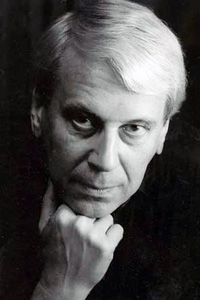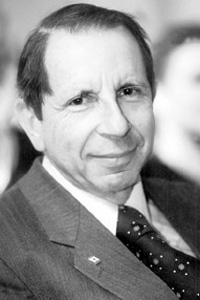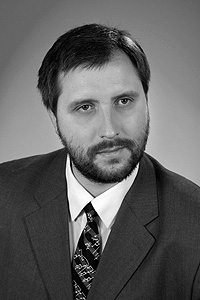 | |
Boris Tishchenko (born 1939)
People’s Artist of Russia (1987), recipient of the Glinka State Prize of Russia (1978), Honoured Artist of Russia (1978), prize-winner at the Prague Spring 1966 International Competition and recipient of the St Petersburg Mayor’s Prize (1995). Member of the Union of Composers of St Petersburg.
Professor at the St Petersburg Conservatoire.
He has written eight symphonies, the grandiose cycle of fife Dante Symphonies, ten concertos for various instrumental ensembles, string quartets, sonatas for various instruments, the ballets Fly-Bee, Twelve and Yaroslavna, the opera The Stolen Sun, the operetta A Cockroach, several vocal cycles and music for theatre productions and films.
The ballet Twelve (a “choreographic performance in one act” after the poem of the same name by Alexander Alexandrovich Blok) was written in 1963 and was staged for the first time one year later at the Kirov Theatre by Leonid Yakobson.
| |
Twelve, one-act ballet after the poem by Alexander Blok (1963)
“A black night. White snow…” Before us lies the first page, the first number or “title” of the one-act ballet Twelve. Before each number, before the notes, a line of poetry is printed on the page. These lines are not spoken aloud, they are not sung, and yet still the composer sprinkles them generously into the score … so that, one way or another … it continued to resound with its rhythm, its music like something written by Blok, as it sounded, it would appear, in the composer’s consciousness… It, this word, bursts out in the flow of the music, guiding it not just in terms of the imagery and meaning, but also in terms of the rhythm and intonation…
“In the music of the ballet, one can sense the speech, the word to such an extent that the individual fragments appear to be intended not for a ballet but for an oratorio where the orchestra has for some reason taken the place of both the chorus and the soloists.”
(Boris Kats. About the Music of Boris Tishchenko. Leningrad, 1986)
|
 | |
Sergei Slonimsky (born 1932)
People’s Artist of Russia, recipient of State Prizes (1983 and 2002) and the Baltic Star International Prize (2009), cavalier of Russia’s order “For Services to the Fatherland”, fourth class, and of the Republic of Poland’s cross of the order “For Services”.
He has composed the operas Virineya, The Master and Margarita, Mary Stuart, Hamlet, Visions of Ivan the Terrible, King Lear and Antigona, the ballets Icarus and The Magic Nut, twenty-seven symphonies, instrumental concertos, sonatas and ensembles, cantatas and oratorical suites, twenty-four preludes and fugues for piano, romances, music for the films The Republic SHKID, Intervention and many other works besides. Slonimsky’s music is performed frequently and has been published and released on CD in Russia and abroad.
Symphony No 21 (From Goethe’s “Faust” ) was composed in 2009.
| |
Symphony No 21. From Goethe’s “Faust” (2009)
This three-movement symphony continues the theme of Faust already approached by Berlioz and Schumann, Liszt and Gounod, Mahler and Schnittke.
The first movement – Faust – embodies Faustian reflection, an uneasy search for the meaning of life and that unattainable beautiful instant that can be bought only at the cost of life itself. The second movement – Marguerite’s Song – is a romantic ballad for mezzo-soprano and orchestra to poetry by Goethe (in the original German). The abandoned Gretchen appears in deep melancholy and loneliness, in bursts of happiness and in bright recollections, on the eve of her terrible demise on earth. At the same time, Goethe’s Marguerite is one of the symbols of “the eternally Feminine” that elevates the human soul and carries it to precious truth and deathlessness. The finale – Walpurgisnacht – uncovers the Mephistophelian in Faust. The Sabbath of evil forces is cut through by motifs of Faust’s will, the rhythms of racing and of flight. At the end, Faust’s theme returns and achieves a monumental culmination accompanied by infernal rhythms and sounds.
|
 | |
Vyacheslav Kruglik (born 1977)
A pupil of Boris Tishchenko, he graduated with distinction from the faculty of composition of the St Petersburg State Rimsky-Korsakov Conservatoire. In 2005 he became a prize-winner at the Mariinsky Theatre’s All-Russian Competition as the composer of the opera The Carriage based on Nikolai Vasilievich Gogol’s tale, premiered during a festival run by the theatre to mark two centuries since the composer’s birth. Together with Svetlana Nesterova, he composed the choreographic quest Semyon. Version 1.0, which was awarded a prize at the Bolshoi Theatre and the Union of Theatre Worker’s competition to create an operatic and choreographic work for children and young people (2008). He has composed a concertino for wind instruments, harp and percussion, two string quartets, the vocal cycles Three Cypresses and About a Horse, sonatas for flute and piano and the ballet scene Two Again.
| |
Symphony (2000)
This symphony is a two-part cycle. The first (Allegro) is in sonata form; the main part is based on a lively, many-times repeated melodic sketch. The contrast comes with the second, song theme – weighty and “sluggish” – clearly of folk origin. As they develop, these themes gradually dominate the entire orchestra and, “weakened” by the conflict, they subside. The slow second movement (Larghetto) is initially born in the deep basses and in its gradual emergence it constantly takes on new registers. This augmentation breaks off on a dynamic culmination. In the ghostly, chamber sound of the harps, flute and clarinet comes a moment which the Ancient Greeks would have called “catharsis”, indicating an enlightening or, at least, a distanced look at a tragedy that has occurred, at suffering endured.
|



